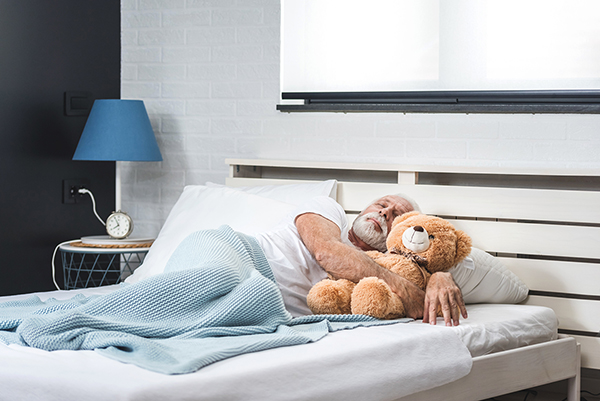




Q: I am a 78-year-old man in great health. My weight is excellent and I exercise and run on a regular schedule. My problem is waking up after four hours and not being able to fall back to sleep. What causes this problem and how can I solve it?
A: I commend you for being proactive in your health and keeping yourself in shape. There may be several reasons for your insomnia.
First, let’s talk sleep hygiene. Make sure your bedroom is completely dark when you go to bed. There shouldn’t be any devices blinking at you (i.e., clock radio, computer, etc.) and no light coming through the windows. Get blackout curtains and shades if this is not the case.
One of the worst things to do before bedtime is use your computer or smart phone. The blue light transmitted from these devices inhibits melatonin production. The pineal gland in your brain senses that it’s still “daylight” and won’t secrete the melatonin you need for a good night’s sleep.
Make sure your bedroom is at an optimal temperature for restful sleep. That’s between 60 and 68 degrees Fahrenheit. When we go to sleep at night, our core temperature goes down a couple degrees. Call it a mini-hibernation that helps us stay asleep. You may not achieve this core temperature if your bedroom is too warm. If your bedroom is cool as a cave and you’re still not able to stay asleep, taking magnesium glycinate at bedtime may help.
Other causes of insomnia are caffeine addiction and adrenal stress, which, in many cases, go hand in hand. Ingesting too much caffeine will disrupt sleep, period. But it will also cause your adrenals to secrete catecholamines and cortisol. These are “fight or flight” hormones that deplete magnesium, which further exacerbates insomnia.
Alcohol and certain medications such as antidepressants, ADHD meds, decongestants, and antihistamines can rob your sleep. Sleep aids such as Ambien and Lunesta aren’t much better for middle-of-the-night wake-ups. They help you fall asleep initially, but that’s about it.
Lastly, a feature of unstable blood sugar is waking up during the night for no apparent reason. Are you carb-loading for your runs? You may benefit from lowering your carb intake during the day and having a protein snack a couple of hours before bedtime to keep your blood sugar stable during the night. This can help you stay asleep.
To your health!
Though we think of declining estrogen as the hallmark of menopause, it's actually common for…

Up to 12 percent of Americans have ulcers at some point in life. Peptic ulcers…
Gallbladder disease is a modern illness. An estimated 20 million Americans have gallbladder disease. The…

There’s more to GI health than whether or not to take an acid-blocker. All too…

In the latest attempt to remove “stigma” from medical terminology, liver specialists have come up…

Q: My husband’s high sensitivity C-reactive protein (hs-CRP) is 1.62 and his homocysteine is 13.1. If…

Banish the Bloat: Leyla Weighs In with Tips and Insights

Our virtual voicemail is open 24/7, so there's no need to wait to submit your questions for Dr. Hoffman. Leave a message, and you may hear your question featured on the Intelligent Medicine radio program!